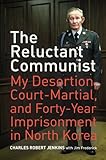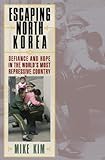|
|
Help |
| Home - Basic N - North Korea History Regional (Books) | |
e99 Online Shopping Mall
|
|
Help |
| Home - Basic N - North Korea History Regional (Books) | |
| 1-20 of 63 | Next 20 |
click price to see details click image to enlarge click link to go to the store
| 1. North of the Dmz: Essays on Daily Life in North Korea by Andrei Lankov | |
 | Paperback: 358
Pages
(2007-04-24)
list price: US$39.95 -- used & new: US$35.00 (price subject to change: see help) Asin: 0786428392 Average Customer Review: Canada | United Kingdom | Germany | France | Japan |
|
Editorial Review Product Description Customer Reviews (8)
| |
| 2. The Reluctant Communist: My Desertion, Court-Martial, and Forty-Year Imprisonment in North Korea by Charles Robert Jenkins, Jim Frederick | |
 | Paperback: 232
Pages
(2009-03-10)
list price: US$16.95 -- used & new: US$10.56 (price subject to change: see help) Asin: 0520259998 Average Customer Review: Canada | United Kingdom | Germany | France | Japan |
|
Editorial Review Product Description Customer Reviews (29)
| |
| 3. Under the Loving Care of the Fatherly Leader: North Korea and the Kim Dynasty by Bradley K. Martin | |
 | Paperback: 896
Pages
(2006-01-10)
list price: US$21.95 -- used & new: US$11.72 (price subject to change: see help) Asin: 0312323220 Average Customer Review: Canada | United Kingdom | Germany | France | Japan |
|
Editorial Review Product Description Customer Reviews (67)
| |
| 4. Preparing for Sudden Change in North Korea (Council on Foreign Relations (Council on Foreign Relations Press)) by Paul B. Stares, Joel S. Wit | |
 | Paperback: 52
Pages
(2009-01-01)
list price: US$10.00 -- used & new: US$7.75 (price subject to change: see help) Asin: 0876094264 Canada | United Kingdom | Germany | France | Japan |
|
Editorial Review Product Description | |
| 5. North Korea Under Kim Jong Il: From Consolidation to Systemic Dissonance by Sung Chull Kim | |
 | Paperback: 294
Pages
(2007-06-01)
list price: US$29.95 -- used & new: US$23.99 (price subject to change: see help) Asin: 079146928X Canada | United Kingdom | Germany | France | Japan |
|
Editorial Review Product Description | |
| 6. Escaping North Korea: Defiance and Hope in the World's Most Repressive Country by Mike Kim | |
 | Paperback: 256
Pages
(2010-05-16)
list price: US$16.95 -- used & new: US$10.08 (price subject to change: see help) Asin: 0742567052 Average Customer Review: Canada | United Kingdom | Germany | France | Japan |
|
Editorial Review Product Description Customer Reviews (19)
| |
| 7. Crisis in North Korea: The Failure of De-Stalinization, 1956 (Hawai'i Studies on Korea) by Andrei N. Lankov | |
 | Paperback: 274
Pages
(2007-06)
list price: US$23.00 -- used & new: US$22.45 (price subject to change: see help) Asin: 0824832078 Average Customer Review: Canada | United Kingdom | Germany | France | Japan |
|
Editorial Review Product Description Lankov traces the impact of Soviet reforms on North Korea, placing them in the context of contemporaneous political crises in Poland and Hungary. He documents the dissent among various social groups (intellectuals, students, party cadres) and their attempts to oust Kim in the unsuccessful "August plot" of 1956. His reconstruction of the Peng-Mikoyan visit of that year--the most dramatic Sino-Soviet intervention into Pyongyang politics--shows how it helped bring an end to purges of the opposition. The purges, however, resumed in less than a year as Kim skillfully began to distance himself from both Moscow and Beijing. The final chapters of this fascinating and revealing study deal with events of the late 1950s that eventually led to Kim's version of "national Stalinism." Lankov unearths data that, for the first time, allows us to estimate the scale and character of North Korea's Great Purge. Meticulously researched and cogently argued, Crisis in North Korea is a must-read for students and scholars of Korea and anyone interested in political leadership and personality cults, regime transition, and communist politics. Customer Reviews (3)
| |
| 8. Exodus to North Korea: Shadows from Japan's Cold War (Asian Voices) by Tessa Morris-Suzuki | |
 | Paperback: 302
Pages
(2007-03-15)
list price: US$33.95 -- used & new: US$24.99 (price subject to change: see help) Asin: 0742554422 Average Customer Review: Canada | United Kingdom | Germany | France | Japan |
|
Editorial Review Product Description Customer Reviews (1)
| |
| 9. Inside the Red Box: North Korea's Post-totalitarian Politics (Contemporary Asia in the World) by Patrick McEachern | |
| Hardcover: 320
Pages
(2010-11-19)
list price: US$35.00 -- used & new: US$28.00 (price subject to change: see help) Asin: 0231153228 Canada | United Kingdom | Germany | France | Japan | |
|
Editorial Review Product Description North Korea's institutional politics defy traditional political models, making the country's actions seem surprising or confusing when, in fact, they often conform to the regime's own logic. Drawing on recent materials, such as North Korean speeches, commentaries, and articles, Patrick McEachern, a specialist on North Korean affairs, reveals how the state's political institutions debate policy and inform and execute strategic-level decisions. Many scholars dismiss Kim Jong-Il's regime as a "one-man dictatorship," calling him the "last totalitarian leader," but McEachern identifies three major institutions that help maintain regime continuity: the cabinet, the military, and the party. These groups hold different institutional policy platforms and debate high-level policy options both before and after Kim and his senior leadership make their final call. This method of rule may challenge expectations, but North Korea does not follow a classically totalitarian, personalistic, or corporatist model. Rather than being monolithic, McEachern argues, the regime, emerging from the crises of the 1990s, rules differently today than it did under Kim's father, Kim Il Sung. The son is less powerful and pits institutions against one another in a strategy of divide and rule. His leadership is fundamentally different: it is "post-totalitarian." Authority may be centralized, but power remains diffuse. McEachern maps this process in great detail, supplying vital perspective on North Korea's reactive policy choices, which continue to bewilder the West., reviewing a previous edition or volume | |
| 10. North Korea: The Paranoid Peninsula: A Modern History, Second Edition by Paul French | |
 | Paperback: 340
Pages
(2007-09-15)
list price: US$34.00 -- used & new: US$22.09 (price subject to change: see help) Asin: 1842779052 Canada | United Kingdom | Germany | France | Japan |
|
Editorial Review Product Description | |
| 11. North Korea at a Crossroads by Suk H. Kim | |
 | Paperback: 232
Pages
(2003-07-31)
list price: US$39.95 -- used & new: US$8.50 (price subject to change: see help) Asin: 0786417412 Average Customer Review: Canada | United Kingdom | Germany | France | Japan |
|
Editorial Review Product Description This historical and political analysis covers the period from the division of the peninsula in 1948 to the future of North Korea beyond 2003. Topics include the Korean War, Kim Il Sung, famine, the economic collapse of the 1990s, Kim Jong Il, South Korea’s sunshine policy, nuclear ambitions, "rogue state" status, George W. Bush’s "axis of evil"remark made during his 2002 State of the Union address, and the current state of diplomatic relations. The final chapter considers the case for reconciliation. Appendix A is a chronology of the Korean Peninsula from 2333 BCE to 2003 CE. Appendix B is a directory of Korean Studies institutes and think tanks. Tables and statistics are integrated throughout the text. Reader aids accompany each chapter, including lists of further reading, key terms and questions. Customer Reviews (8)
| |
| 12. Inventing the Axis of Evil: The Truth About North Korea, Iran, and Syria by Bruce Cumings, Ervand Abrahamian, Moshe Ma'oz | |
 | Paperback: 224
Pages
(2006-01-08)
list price: US$14.95 -- used & new: US$4.95 (price subject to change: see help) Asin: 1595580387 Average Customer Review: Canada | United Kingdom | Germany | France | Japan |
|
Editorial Review Product Description Customer Reviews (2)
| |
| 13. From Stalin to Kim: The Formation of North Korea 1945-1960 by Andrei Lankov | |
 | Hardcover: 2250
Pages
(2001-09)
list price: US$125.00 Isbn: 1850655634 Canada | United Kingdom | Germany | France | Japan |
|
Editorial Review Product Description | |
| 14. North Korea In Quotation: A Worldwide Treasury, 1948-2004 by Steve Shipp | |
 | Paperback: 390
Pages
(2005-06-16)
list price: US$75.00 -- used & new: US$22.00 (price subject to change: see help) Asin: 078642107X Canada | United Kingdom | Germany | France | Japan |
|
Editorial Review Product Description | |
| 15. Historical Dictionary of North Korea (Historical Dictionaries of Asia, Oceania, and the Middle East) by Ilpyong J. Kim | |
 | Hardcover: 280
Pages
(2003-02-25)
list price: US$90.20 -- used & new: US$53.93 (price subject to change: see help) Asin: 0810843315 Canada | United Kingdom | Germany | France | Japan |
|
Editorial Review Product Description | |
| 16. North Korea: A Country Study (Area Handbook Series) | |
| Hardcover: 346
Pages
(1994-08-31)
list price: US$50.00 -- used & new: US$19.95 (price subject to change: see help) Asin: 0844407941 Canada | United Kingdom | Germany | France | Japan | |
| 17. North Korea: A Strange Socialist Fortress by Hy-Sang Lee | |
 | Hardcover: 264
Pages
(2000-11-30)
list price: US$125.00 -- used & new: US$53.87 (price subject to change: see help) Asin: 0275969177 Average Customer Review: Canada | United Kingdom | Germany | France | Japan |
|
Editorial Review Product Description Customer Reviews (1)
| |
| 18. Separated at Birth: How North Korea Became the Evil Twin by Gordon Cucullu | |
 | Hardcover: 320
Pages
(2004-09-01)
list price: US$24.95 -- used & new: US$2.00 (price subject to change: see help) Asin: 1592285910 Average Customer Review: Canada | United Kingdom | Germany | France | Japan |
|
Editorial Review Product Description Customer Reviews (10)
| |
| 19. Bipolar Orders: The Two Koreas since 1989 (Global History of the Present) by Hyung Gu Lynn | |
 | Hardcover: 192
Pages
(2007-11-15)
list price: US$80.00 -- used & new: US$72.77 (price subject to change: see help) Asin: 1842777424 Canada | United Kingdom | Germany | France | Japan |
|
Editorial Review Product Description | |
| 20. To the Diamond Mountains: A Hundred-Year Journey through China and Korea (Asia/Pacific/Perspectives) by Tessa Morris-Suzuki | |
 | Hardcover: 216
Pages
(2010-11-16)
list price: US$34.95 -- used & new: US$25.16 (price subject to change: see help) Asin: 1442205032 Canada | United Kingdom | Germany | France | Japan |
|
Editorial Review Product Description | |
| 1-20 of 63 | Next 20 |